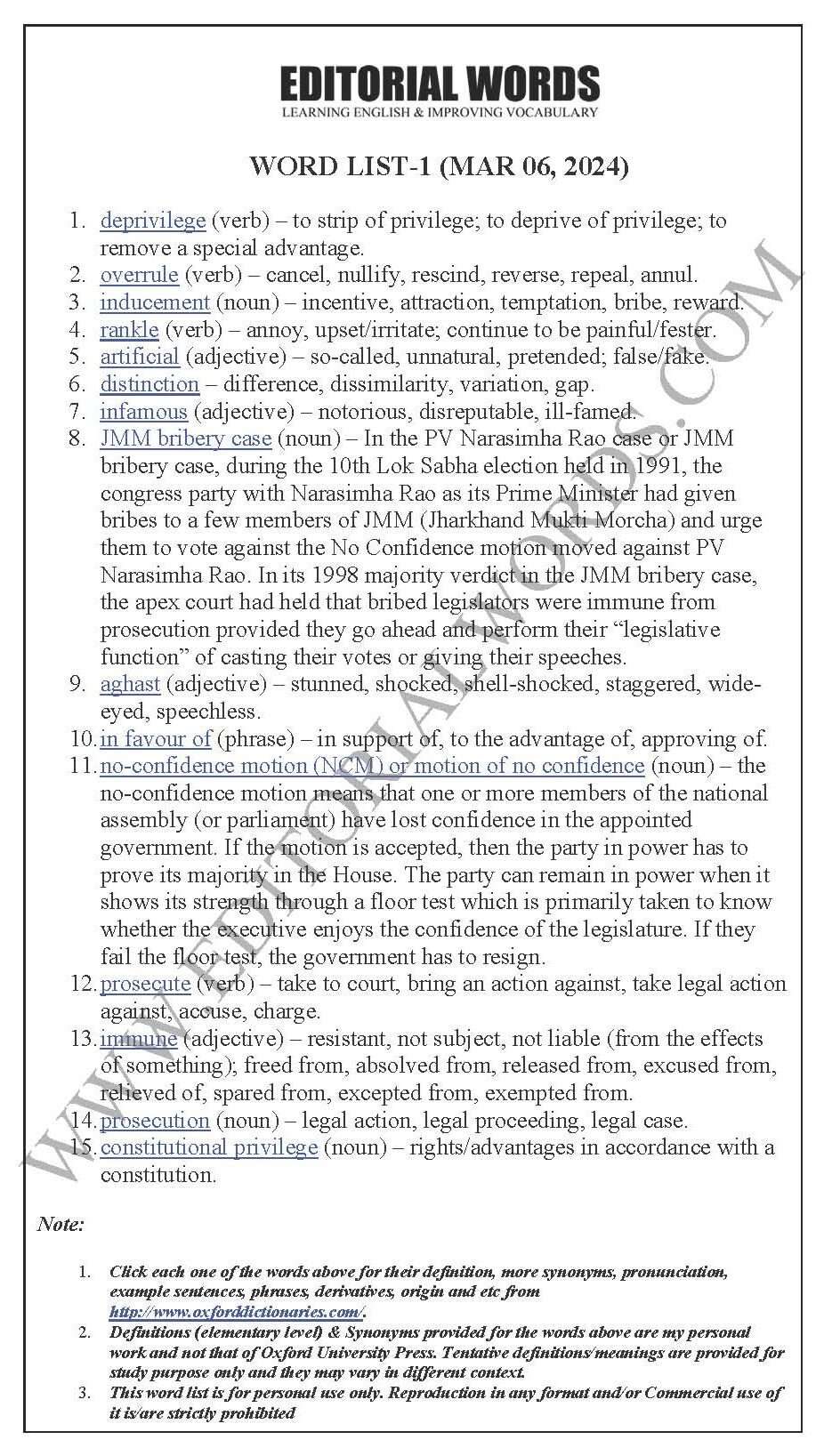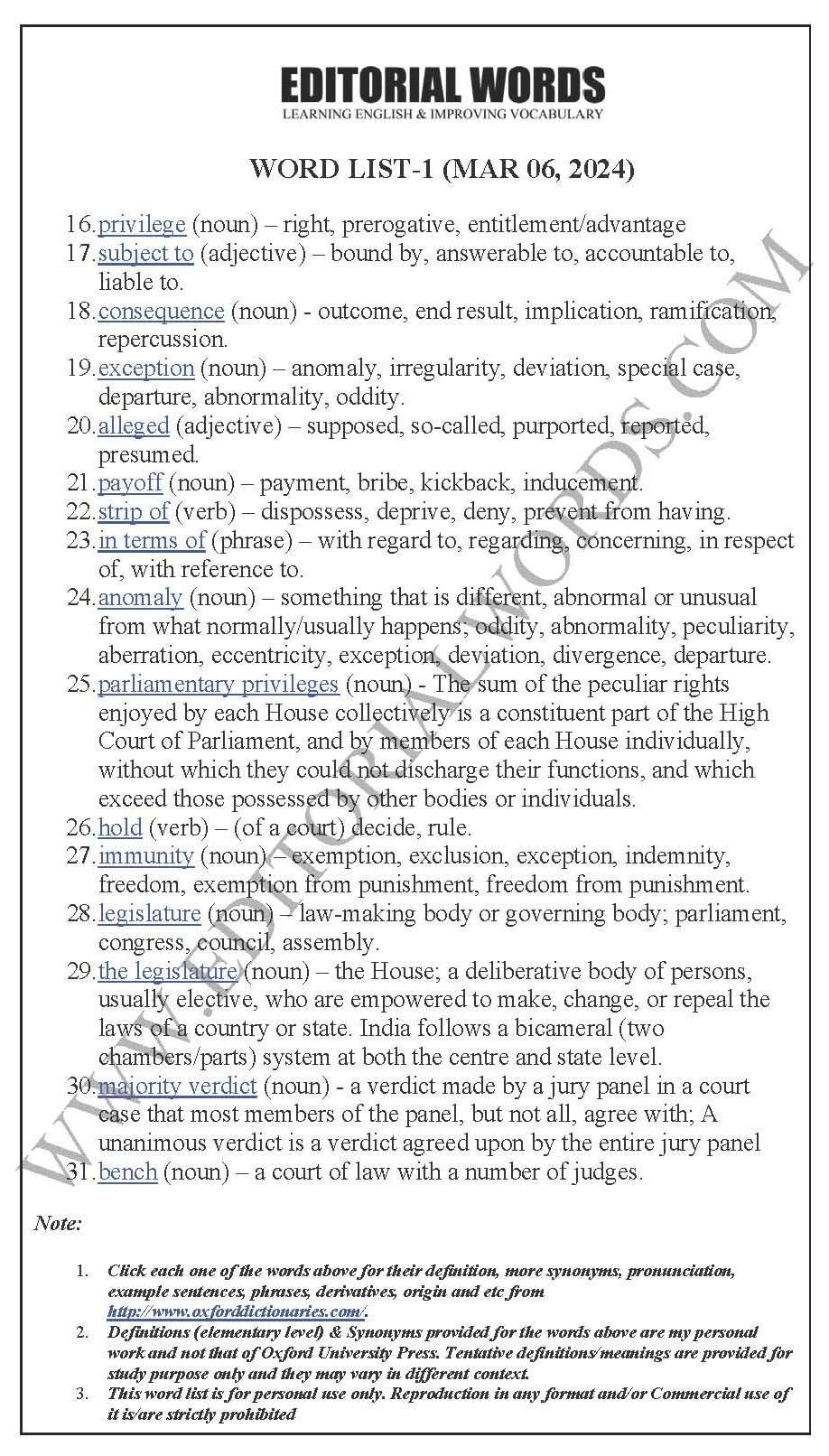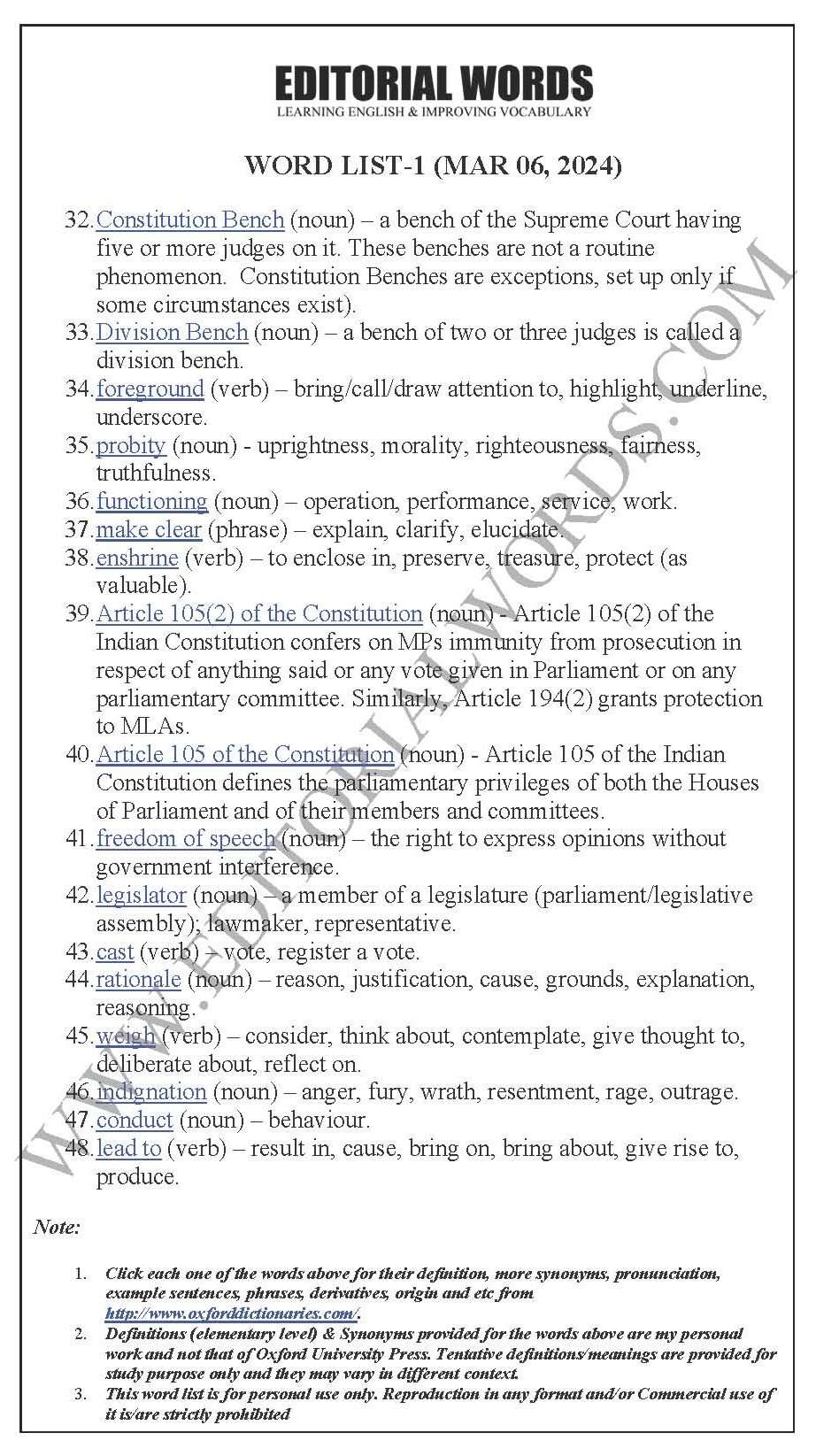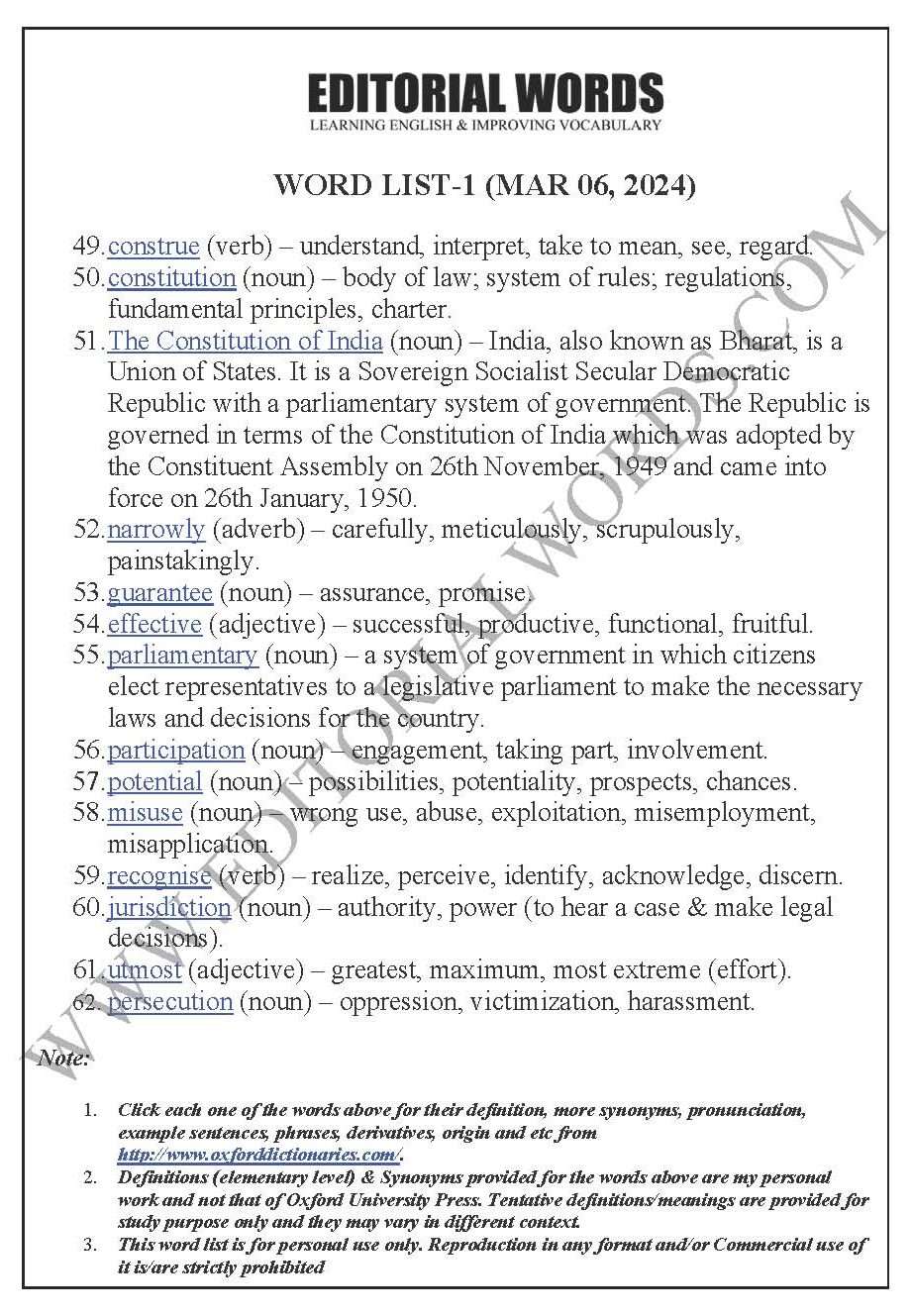The Hindu Editorial (Deprivileging bribe) – Mar 06, 2024
To read this article, click “The Hindu”.
This preview is provided here with permission.
Courtesy: The Hindu
The Hindu Editorial (Deprivileging bribe) – Mar 06, 2024:
- deprivilege (verb) – to strip of privilege; to deprive of privilege; to remove a special advantage.
- overrule (verb) – cancel, nullify, rescind, reverse, repeal, annul.
- inducement (noun) – incentive, attraction, temptation, bribe, reward.
- rankle (verb) – annoy, upset/irritate; continue to be painful/fester.
- artificial (adjective) – so-called, unnatural, pretended; false/fake.
- distinction – difference, dissimilarity, variation, gap.
- infamous (adjective) – notorious, disreputable, ill-famed.
- JMM bribery case (noun) – In the PV Narasimha Rao case or JMM bribery case, during the 10th Lok Sabha election held in 1991, the congress party with Narasimha Rao as its Prime Minister had given bribes to a few members of JMM (Jharkhand Mukti Morcha) and urge them to vote against the No Confidence motion moved against PV Narasimha Rao. In its 1998 majority verdict in the JMM bribery case, the apex court had held that bribed legislators were immune from prosecution provided they go ahead and perform their “legislative function” of casting their votes or giving their speeches.
- aghast (adjective) – stunned, shocked, shell-shocked, staggered, wide-eyed, speechless.
- in favour of (phrase) – in support of, to the advantage of, approving of.
- no-confidence motion (NCM) or motion of no confidence (noun) – the no-confidence motion means that one or more members of the national assembly (or parliament) have lost confidence in the appointed government. If the motion is accepted, then the party in power has to prove its majority in the House. The party can remain in power when it shows its strength through a floor test which is primarily taken to know whether the executive enjoys the confidence of the legislature. If they fail the floor test, the government has to resign.
- prosecute (verb) – take to court, bring an action against, take legal action against, accuse, charge.
- immune (adjective) – resistant, not subject, not liable (from the effects of something); freed from, absolved from, released from, excused from, relieved of, spared from, excepted from, exempted from.
- prosecution (noun) – legal action, legal proceeding, legal case.
- constitutional privilege (noun) – rights/advantages in accordance with a constitution.
- privilege (noun) – right, prerogative, entitlement/advantage
- subject to (adjective) – bound by, answerable to, accountable to, liable to.
- consequence (noun) – outcome, end result, implication, ramification, repercussion.
- exception (noun) – anomaly, irregularity, deviation, special case, departure, abnormality, oddity.
- alleged (adjective) – supposed, so-called, purported, reported, presumed.
- payoff (noun) – payment, bribe, kickback, inducement.
- strip of (verb) – dispossess, deprive, deny, prevent from having.
- in terms of (phrase) – with regard to, regarding, concerning, in respect of, with reference to.
- anomaly (noun) – something that is different, abnormal or unusual from what normally/usually happens; oddity, abnormality, peculiarity, aberration, eccentricity, exception, deviation, divergence, departure.
- parliamentary privileges (noun) – The sum of the peculiar rights enjoyed by each House collectively is a constituent part of the High Court of Parliament, and by members of each House individually, without which they could not discharge their functions, and which exceed those possessed by other bodies or individuals.
- hold (verb) – (of a court) decide, rule.
- immunity (noun) – exemption, exclusion, exception, indemnity, freedom, exemption from punishment, freedom from punishment.
- legislature (noun) – law-making body or governing body; parliament, congress, council, assembly.
- the legislature (noun) – the House; a deliberative body of persons, usually elective, who are empowered to make, change, or repeal the laws of a country or state. India follows a bicameral (two chambers/parts) system at both the centre and state level.
- majority verdict (noun) – a verdict made by a jury panel in a court case that most members of the panel, but not all, agree with; A unanimous verdict is a verdict agreed upon by the entire jury panel
- bench (noun) – a court of law with a number of judges.
- Constitution Bench (noun) – a bench of the Supreme Court having five or more judges on it. These benches are not a routine phenomenon. Constitution Benches are exceptions, set up only if some circumstances exist).
- Division Bench (noun) – a bench of two or three judges is called a division bench.
- foreground (verb) – bring/call/draw attention to, highlight, underline, underscore.
- probity (noun) – uprightness, morality, righteousness, fairness, truthfulness.
- functioning (noun) – operation, performance, service, work.
- make clear (phrase) – explain, clarify, elucidate.
- enshrine (verb) – to enclose in, preserve, treasure, protect (as valuable).
- Article 105(2) of the Constitution (noun) – Article 105(2) of the Indian Constitution confers on MPs immunity from prosecution in respect of anything said or any vote given in Parliament or on any parliamentary committee. Similarly, Article 194(2) grants protection to MLAs.
- Article 105 of the Constitution (noun) – Article 105 of the Indian Constitution defines the parliamentary privileges of both the Houses of Parliament and of their members and committees.
- freedom of speech (noun) – the right to express opinions without government interference.
- legislator (noun) – a member of a legislature (parliament/legislative assembly); lawmaker, representative.
- cast (verb) – vote, register a vote.
- rationale (noun) – reason, justification, cause, grounds, explanation, reasoning.
- weigh (verb) – consider, think about, contemplate, give thought to, deliberate about, reflect on.
- indignation (noun) – anger, fury, wrath, resentment, rage, outrage.
- conduct (noun) – behaviour.
- lead to (verb) – result in, cause, bring on, bring about, give rise to, produce.
- construe (verb) – understand, interpret, take to mean, see, regard.
- constitution (noun) – body of law; system of rules; regulations, fundamental principles, charter.
- The Constitution of India (noun) – India, also known as Bharat, is a Union of States. It is a Sovereign Socialist Secular Democratic Republic with a parliamentary system of government. The Republic is governed in terms of the Constitution of India which was adopted by the Constituent Assembly on 26th November, 1949 and came into force on 26th January, 1950.
- narrowly (adverb) – carefully, meticulously, scrupulously, painstakingly.
- guarantee (noun) – assurance, promise.
- effective (adjective) – successful, productive, functional, fruitful.
- parliamentary (noun) – a system of government in which citizens elect representatives to a legislative parliament to make the necessary laws and decisions for the country.
- participation (noun) – engagement, taking part, involvement.
- potential (noun) – possibilities, potentiality, prospects, chances.
- misuse (noun) – wrong use, abuse, exploitation, misemployment, misapplication.
- recognise (verb) – realize, perceive, identify, acknowledge, discern.
- jurisdiction (noun) – authority, power (to hear a case & make legal decisions).
- utmost (adjective) – greatest, maximum, most extreme (effort).
- persecution (noun) – oppression, victimization, harassment.
Note :
1. Click each one of the words above for their definition, more synonyms, pronunciation, example sentences, phrases, derivatives, origin and etc. from http://www.oxforddictionaries.com/.
2. Definitions (elementary level) & Synonyms provided for the words above are my personal work and not that of Oxford University Press. Tentative definitions/meanings are provided for study purposes only and they may vary in a different context.
3. This word list is for personal use only. Reproduction in any format and/or Commercial use of it is/are strictly prohibited.
The Hindu Editorial (Deprivileging bribe) – Mar 06, 2024:




“Phrasal Verbs” We Learnt Last Week
“Idioms & Phrases” We Learnt Last Week
“Important Definitions” We Learnt Last Week
Recent Word Lists For The Hindu Editorial Articles

It was a judgment that has rankled for years. The artificial distinction that the Supreme Court of India made over 25 years ago between ‘bribe-givers’ and ‘bribe-takers’ in the infamous JMM bribery case left many aghast that… For further reading, visit “The Hindu”. Below is today’s word list-1 for The Hindu Editorial (Deprivileging bribe) – Mar 06, 2024.